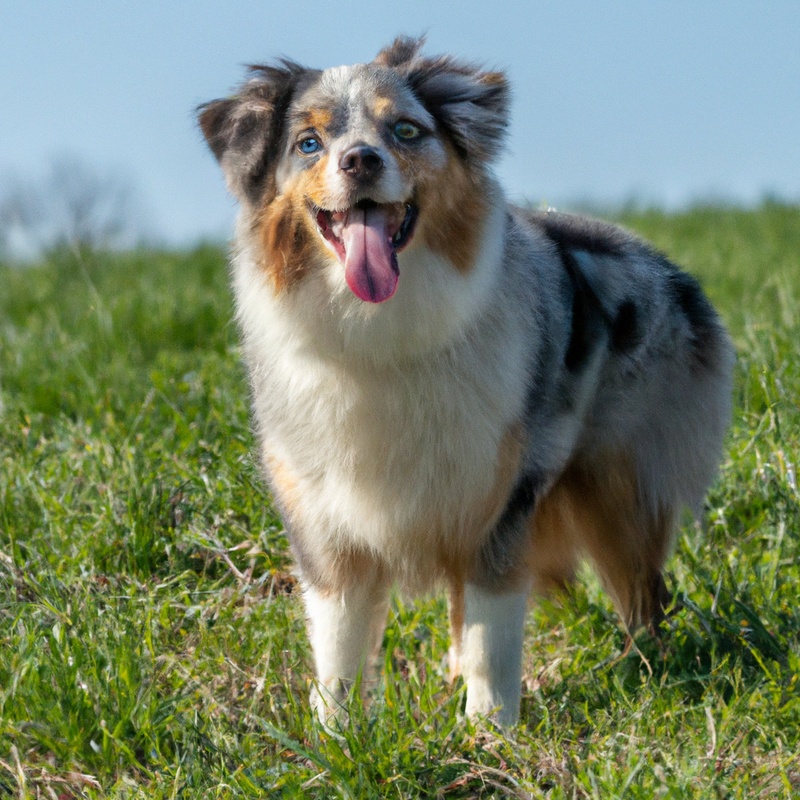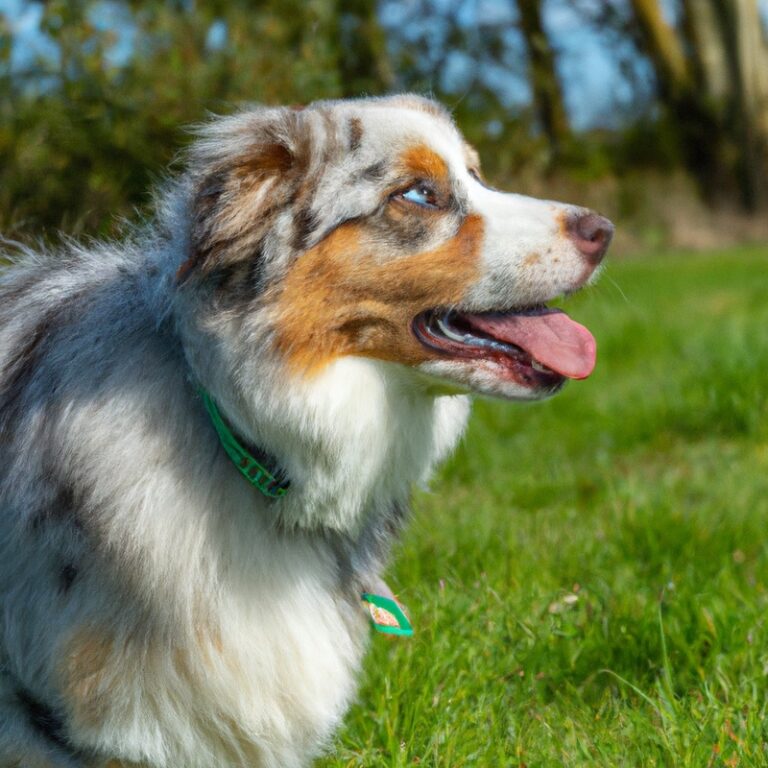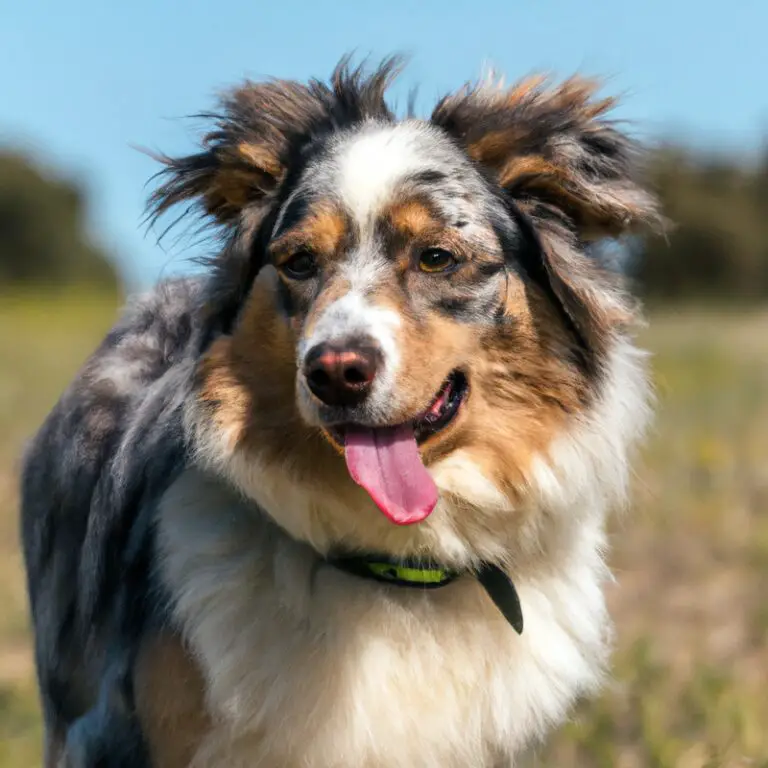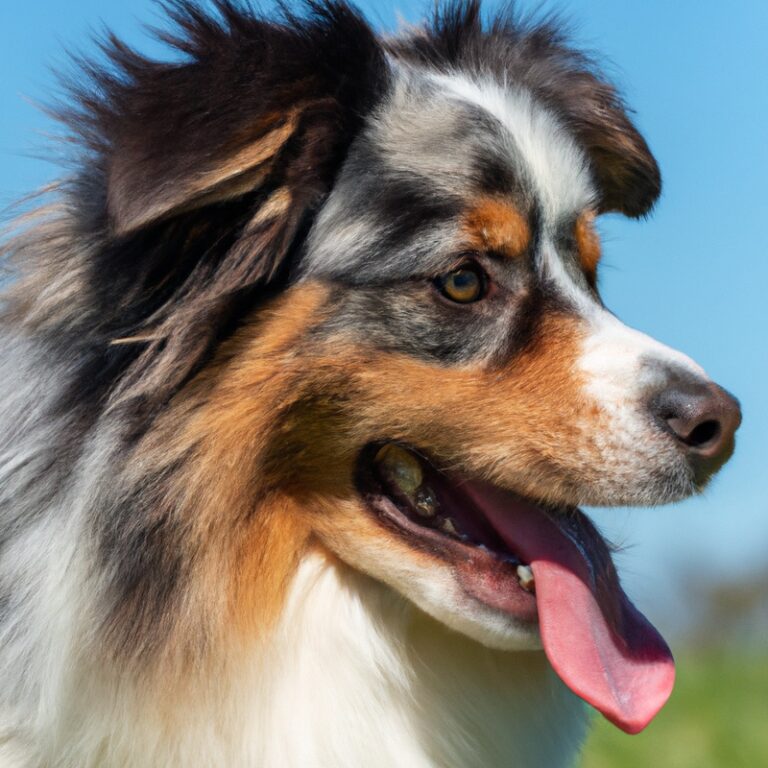How Can I Properly Socialize My Australian Shepherd?
Key Takeaways:
- Positive and consistent training is essential for socializing Australian Shepherds.
- Early exposure to different people, animals, and environments helps Australian Shepherds become well-rounded and socialized.
- Slow and gradual introductions are important to prevent overwhelm and fear in Australian Shepherds.
- Ongoing socialization throughout their life helps Australian Shepherds maintain their social skills and adaptability.
Do you dream of having a well-behaved and socially confident Australian Shepherd by your side? Well, look no further! As an expert in dog behavior and training, I’m here to guide you through the ins and outs of properly socializing your Australian Shepherd.
It’s essential to understand the unique characteristics of the breed and the importance of socialization in their development.
We’ll discuss when to start socializing, effective techniques for positive reinforcement training, and how to introduce your Aussie to both dogs and humans. Get ready to unlock your Australian Shepherd’s social potential and create a strong bond that lasts a lifetime!
| Pros | Cons |
| 1. Australian Shepherds are social and friendly dogs | 1. They have high energy levels and require a lot of exercise |
| 2. They are intelligent and trainable | 2. They can become bored easily and may develop destructive behaviors |
| 3. They are great with kids and other pets when properly socialized | 3. They may have a tendency to herd and nip at heels if not trained and socialized properly |
| 4. Australian Shepherds can participate in various dog sports and activities | 4. They may exhibit separation anxiety if left alone for long periods of time |
Understanding the Australian Shepherd breed
Key characteristics of Australian Shepherds
Australian Shepherds are known for their intelligence, agility, and high energy levels. They are an exceptional working breed, often used as herding dogs on farms.
These dogs are highly trainable and excel in various dog sports and activities, including obedience trials and agility courses.
They have a strong herding instinct and are protective of their family. Australian Shepherds are loyal, affectionate, and thrive in an active and stimulating environment.
They require plenty of physical exercise and mental stimulation to prevent boredom and destructive behavior.
The importance of socialization for Australian Shepherds
Socialization is incredibly important for Australian Shepherds. It helps them develop good behavior, adapt to new environments, and build positive relationships with people and other animals.
By socializing your Australian Shepherd from an early age, you can prevent behavior problems and ensure they grow up to be well-rounded and confident dogs.
It’s crucial to expose them to different places, sounds, smells, and situations, as well as introduce them to a variety of people and animals. This will help them become comfortable and confident in various social settings.
Remember, socialization is an ongoing process that should be continued throughout your Australian Shepherd’s life.
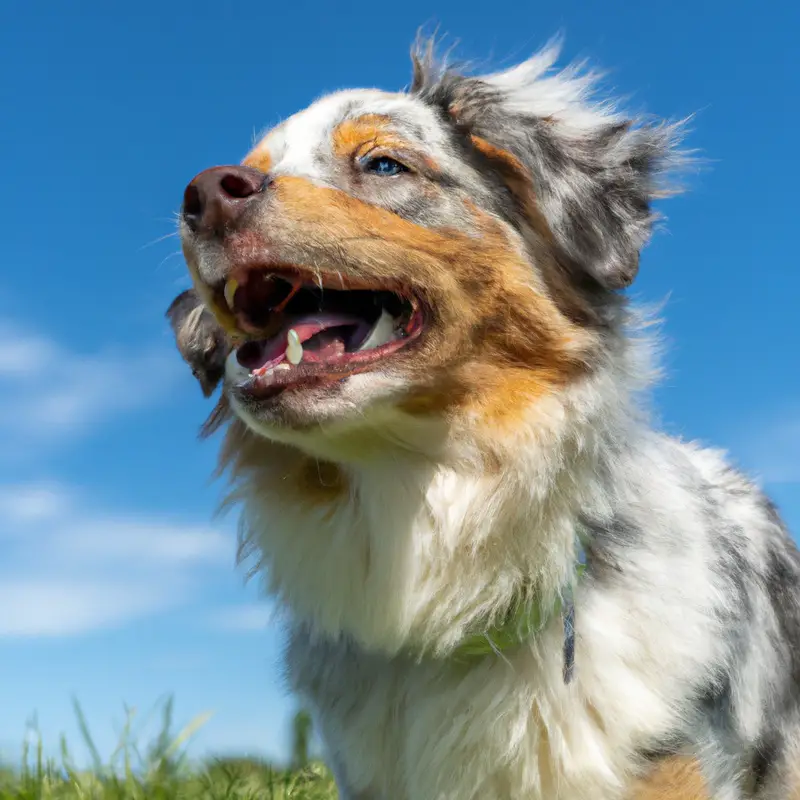
When to start socializing your Australian Shepherd
The critical socialization period for Australian Shepherds
The critical socialization period for Australian Shepherds is when they are between 3 and 14 weeks old. This is the time when they are most receptive to new experiences and can easily learn how to interact with the world around them.
During this period, it is important to expose them to various people, animals, and environments to help them build confidence and develop good social skills.
Missing this critical period can result in behavioral issues later on, so it’s crucial to start socializing your Australian Shepherd as early as possible.
Signs that your Australian Shepherd needs socialization
If your Australian Shepherd is exhibiting any of these signs, it’s a clear indication that they need socialization:
- Fear or aggression towards strangers or other animals: If your Australian Shepherd becomes anxious or aggressive in the presence of unfamiliar people or animals, it shows a lack of exposure and socialization.
- Excessive barking or growling: Persistent barking or growling at strangers or other dogs may suggest a need for socialization. This behavior can be an expression of fear or territoriality.
- Shyness or hiding: If your Australian Shepherd frequently hides or displays fearful behavior in new environments or around new people, it indicates a lack of socialization.
- Difficulty adapting to new situations: If your Australian Shepherd struggles to adapt to new environments, such as experiencing anxiety or disorientation during outings, it suggests a need for socialization.
- Unpredictable or defensive behavior: If your Australian Shepherd displays unpredictable or defensive behavior, such as snapping or biting, it may be a result of inadequate socialization and a lack of trust in unfamiliar situations.
Remember, socialization is an ongoing process. By identifying these signs early on, you can take the necessary steps to address the issue and provide your Australian Shepherd with the socialization they need.
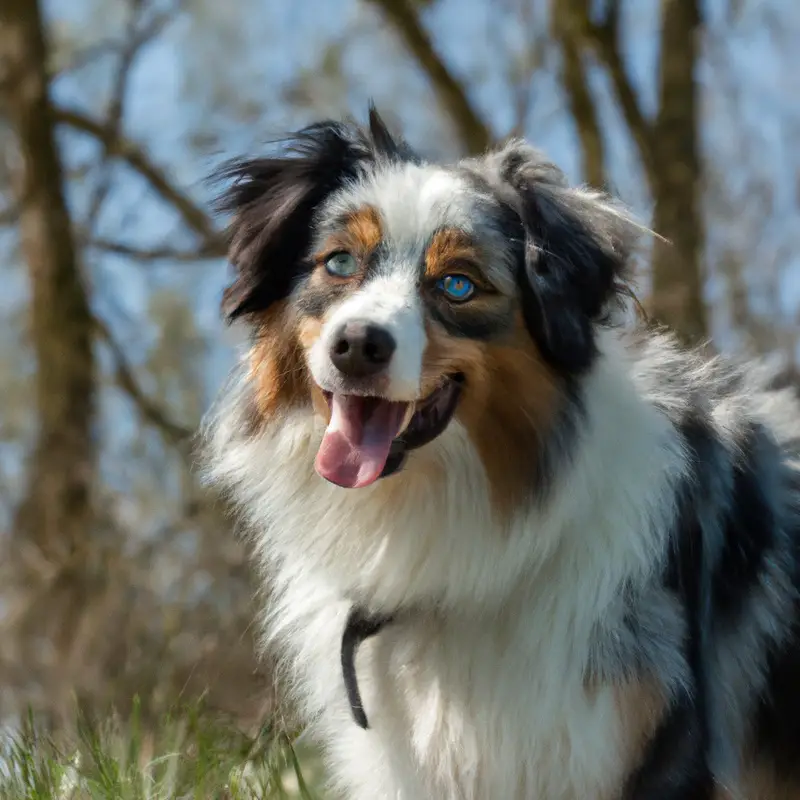
Socialization techniques for your Australian Shepherd
Positive reinforcement training methods
Positive reinforcement training methods are highly effective for socializing Australian Shepherds. I personally find that using positive reinforcement, such as treats and praise, helps to reinforce good behavior and encourage your Australian Shepherd to develop positive associations with social situations.
For example, when introducing your Australian Shepherd to new people or animals, reward them with treats and praise when they display calm and friendly behavior.
This will help them learn that social interactions are pleasant and rewarding. Additionally, using positive reinforcement during training sessions can help your Australian Shepherd learn and obey basic commands, which can be useful in social situations.
Focus on rewarding good behavior rather than punishing bad behavior, as this approach is more effective and creates a positive and happy environment for your Australian Shepherd.
Exposing your Australian Shepherd to various environments and stimuli
Exposing your Australian Shepherd to various environments and stimuli is essential for their socialization. It helps them become comfortable and confident in different situations.
Take your Australian Shepherd to different places such as parks, beaches, and busy streets.
This allows them to experience different sights, sounds, and smells. Introduce them to various stimuli like different types of surfaces to walk on, different objects to interact with, and different animals to meet.
This helps them develop adaptability and reduces the likelihood of fear or anxiety towards new things.
Start with mild environments and gradually increase the level of difficulty as your Australian Shepherd becomes more comfortable. Remember to provide positive reinforcement during these exposures, offering treats or praise when they exhibit calm and confident behavior.
Expose them to loud noises, such as thunder or fireworks, by gradually increasing the volume over time.
This helps them become desensitized and less fearful. Overall, exposing your Australian Shepherd to various environments and stimuli from an early age is crucial for their socialization and overall well-being.
Regular exposure throughout their life also helps maintain their social skills and confidence.
Introducing your Australian Shepherd to new people and animals
Introducing your Australian Shepherd to new people and animals is an important part of their socialization. It helps them become comfortable and confident in various situations.
When introducing your Shepherd to new people, start by allowing them to approach at their own pace.
Encourage gentle interactions and reward positive behavior with treats or praise. When it comes to introducing your Shepherd to new animals, always prioritize safety.
Start with controlled, supervised meetings and observe their body language closely.
Gradually increase exposure and monitor their interactions for signs of aggression or fear. If any issues arise, seek guidance from a professional trainer.
Remember, every Shepherd is unique, so be patient and understanding throughout the process.
By providing positive experiences and gradually exposing them to new people and animals, you can help your Australian Shepherd develop into a well-socialized and friendly companion.

Socializing your Australian Shepherd with other dogs
Benefits of dog-to-dog socialization
Dog-to-dog socialization offers a range of benefits for your Australian Shepherd. It helps them develop crucial social skills and build confidence when interacting with other dogs.
By exposing your Australian Shepherd to different dogs and playmates, they learn how to communicate effectively and understand canine body language.
This can prevent them from developing fear or aggression towards other dogs in the future. Dog-to-dog socialization also provides mental stimulation and exercise, keeping your Australian Shepherd physically and mentally healthy.
It allows them to burn off energy and have fun while engaging in appropriate play behaviors.
So, regularly socializing your Australian Shepherd with other dogs is key to their overall well-being and happiness.
How to facilitate positive interactions with other dogs
To facilitate positive interactions between your Australian Shepherd and other dogs, there are a few important steps you can take. Firstly, it’s crucial to choose suitable playmates for your dog.
Look for dogs that have a similar energy level and play style to ensure compatibility.
This will help prevent any potential conflicts or misunderstandings. Secondly, always introduce the dogs in a neutral environment, such as a park or open space.
This helps reduce territorial instincts and creates a more relaxed atmosphere for both dogs to interact.
It’s also important to keep the initial meetings brief and positive to prevent any overwhelming or negative experiences. Thirdly, use positive reinforcement training techniques during interactions.
Reward your dog for calm and friendly behavior around other dogs.
You can praise, treat, or use a favorite toy as a reward. This positive association will encourage your Australian Shepherd to associate other dogs with positive experiences.
During playtime, closely monitor the interactions between the dogs.
Look for signs of discomfort or tension, such as stiff body language, growling, or raised fur. If you notice any signs of aggression or unease, calmly separate the dogs and redirect their attention to a more positive activity.
In addition, it’s essential to respect your dog’s boundaries and give them space when needed.
Not all dogs enjoy constant or intense socialization, so it’s important to observe their individual preferences and comfort levels.
Addressing potential behavior problems during socialization
Addressing potential behavior problems during socialization is an important aspect of raising an Australian Shepherd. It’s common for dogs to exhibit certain behaviors during the socialization process, but with proper guidance and training, these problems can be addressed effectively.
One behavior problem that may arise is fear or aggression towards other dogs or humans.
Patience and positive reinforcement are key in these situations. Gradually exposing your Australian Shepherd to new environments, people, and animals, while rewarding calm and friendly behavior, can help overcome these issues.
Seeking professional help from a dog trainer or behaviorist may also be beneficial in addressing any behavior problems that arise during socialization.
Socializing your Australian Shepherd with humans
Importance of human socialization for Australian Shepherds
Human socialization is vital for Australian Shepherds. It helps them develop good behavior and positive relationships with people.
When Australian Shepherds are properly socialized with humans from an early age, they become more confident and adaptable in various situations.
They learn how to interact with different types of people, including strangers, children, and visitors. This socialization also helps prevent fear and aggression towards humans, which can be a problem with this breed.
By exposing your Australian Shepherd to various human experiences and providing positive reinforcement, you can ensure they grow up to be friendly and well-adjusted dogs.
Tips for introducing your Australian Shepherd to new people
When introducing your Australian Shepherd to new people, it’s important to remember a few tips to ensure a positive and successful experience. Here are some straightforward and concise tips for introducing your Australian Shepherd to new people:
- Start with familiar faces: Begin by introducing your Australian Shepherd to people they already know and trust, such as family members and close friends. This will help build their confidence and establish a positive association with meeting new people.
- Gradual introductions: Take things slow and allow your Australian Shepherd to approach new people at their own pace. Avoid overwhelming them with a large group of strangers all at once. Instead, introduce one person at a time in a calm and controlled environment.
- Positive reinforcement: Reward your Australian Shepherd with praise, treats, or playtime whenever they interact positively with new people. This will help them associate meeting new people with positive experiences.
- Controlled environments: Choose quiet and comfortable places for introductions, such as your home or a familiar park. Avoid crowded or noisy areas that may cause your Australian Shepherd to feel anxious or overwhelmed.
- Respect boundaries: Encourage new people to respect your Australian Shepherd’s personal space. Some dogs may need a little more time to warm up to strangers, so it’s important to give them the space they need and not force interactions.
- Patience and consistency: Socializing your Australian Shepherd takes time and patience. Be consistent in your training and socialization efforts, and don’t get discouraged if progress is slow. Each dog is unique and may require different amounts of time to adjust to new people.
Avoiding or addressing fear and aggression towards humans
When it comes to avoiding or addressing fear and aggression towards humans in Australian Shepherds, it’s important to start early and use positive reinforcement training methods. Introduce your dog to different people gradually, ensuring that each interaction is positive and rewarding.
If your Australian Shepherd displays signs of fear or aggression, seek professional help to address the underlying issues.
Remember, patience and consistency are key in helping your dog overcome these challenges and develop a positive attitude towards humans. Avoid any harsh or punitive training methods, as this can exacerbate fear and aggression.
Your goal is to create a safe and positive environment for your Australian Shepherd to socialize with humans.
Socialization challenges and solutions for Australian Shepherds
Dealing with leash reactivity during socialization
Dealing with leash reactivity during socialization can be a common challenge for Australian Shepherds. Leash reactivity is when your dog displays aggressive or fearful behavior towards other dogs or people while on a leash.
It’s important to address this issue to ensure a positive socialization experience for your dog.
One way to deal with leash reactivity is by using positive reinforcement training techniques. Reward your dog for calm behavior, such as sitting or looking at you, when they encounter triggers while on a leash.
Use treats or praise to reinforce good behavior and redirect their attention away from the trigger.
Another strategy is to gradually expose your Australian Shepherd to triggers in a controlled environment. Start with low-intensity situations, such as being near a calm dog or a person from a distance, and gradually decrease the distance over time as your dog becomes more comfortable.
This helps them build positive associations with the triggers and reduces their reactivity.
Using a head halter or a front-clip harness can also be helpful in managing leash reactivity. These tools give you more control over your dog’s movements and make it easier to redirect their attention away from triggers.
It’s important to remain calm and patient when dealing with leash reactivity.
Avoid punishment or scolding, as this can make the problem worse. Seek guidance from a professional trainer or behaviorist if you’re struggling to address leash reactivity on your own.
By using positive reinforcement techniques, gradually exposing your dog to triggers, and seeking professional help if needed, you can effectively deal with leash reactivity during socialization and help your Australian Shepherd become more confident and well-adjusted.
Overcoming fear and anxiety in Australian Shepherds
Fear and anxiety in Australian Shepherds can be challenging, but it’s important to address these issues for their well-being. One way to overcome fear and anxiety in Australian Shepherds is through gradual exposure.
Start by introducing them to low-stress situations and gradually increase the difficulty.
Positive reinforcement training can also help build confidence and reduce anxiety. Seek professional help if the fear and anxiety persist or worsen.
Remember, patience and consistency are key in helping your Australian Shepherd overcome their fears.
Seeking professional help for socialization issues
If you’re facing challenges with socializing your Australian Shepherd, seeking professional help can be a great solution. A professional dog trainer or behaviorist can provide you with valuable guidance and support.
They have expertise in addressing socialization issues and can create a customized training plan for your Australian Shepherd.
When looking for a professional, choose someone who has experience working with Australian Shepherds or similar breeds. They will have a better understanding of the specific needs and traits of your dog.
Make sure to check their qualifications and certifications to ensure they are qualified to assist you.
During the training sessions, the professional will observe your dog’s behavior and analyze the root causes of their socialization issues. They will then develop a step-by-step plan to address these issues and gradually expose your Australian Shepherd to various stimuli and environments.
Professional trainers can also teach you effective techniques for positively reinforcing good behavior during socialization.
They will guide you on how to use rewards and praise to encourage your Australian Shepherd’s confidence and sociability. Additionally, seeking professional help can be particularly beneficial if your Australian Shepherd displays fear or aggression towards humans or other animals.
Trainers can provide specialized strategies to help your dog overcome these issues safely and effectively.
Remember, seeking professional help is not a sign of failure as a dog owner. It shows that you are committed to helping your Australian Shepherd become a well-socialized and happy companion.
With the guidance and expertise of a professional, you can overcome socialization challenges and provide your Australian Shepherd with the necessary skills to thrive in various social situations.
Maintaining socialization habits throughout your Australian Shepherd’s life
The importance of lifelong socialization
Lifelong socialization plays a vital role in the development of your Australian Shepherd. It is important to continue socializing your dog even after the critical socialization period.
Socialization helps your Australian Shepherd become well-rounded and comfortable in various environments, making them more adaptable and less prone to anxiety or aggression.
By exposing your Australian Shepherd to different people, animals, and environments throughout their life, you can help them maintain positive social behaviors and prevent any regression in their social skills. Regular socialization also helps prevent fear or aggression towards unfamiliar situations or individuals.
Incorporating socialization into your daily routines is key to ensuring lifelong socialization for your Australian Shepherd.
This can include taking them on walks to expose them to different sounds, sights, and smells or organizing playdates with other dogs to promote healthy interactions. Providing opportunities for continued socialization in adulthood is also crucial.
This can involve enrolling your Australian Shepherd in obedience classes or agility training, where they can interact with other dogs and learn valuable skills.
Regular visits to dog parks and engaging in activities that involve new experiences can also contribute to their ongoing social development. If you notice any difficulties with socialization or behavior problems, seeking professional help from a qualified trainer or behaviorist is recommended.
They can provide guidance and support in addressing any issues and ensure your Australian Shepherd continues to develop positive social behaviors throughout their life.
Remember, the key to lifelong socialization is to consistently expose your Australian Shepherd to a variety of people, animals, and environments, and to continue providing opportunities for socialization even as they grow older. This will help them navigate the world confidently and build strong relationships with others.
Incorporating socialization into daily routines
Incorporating socialization into your daily routines is essential for your Australian Shepherd’s overall well-being. It helps them develop positive behavior and adaptability in various situations.
One way to do this is by taking your dog on regular walks in different environments, such as parks or busy streets.
During these walks, you can expose them to new sights, sounds, and smells, which will help them become more comfortable and confident in different situations. Additionally, you can invite friends or family members over to your home to familiarize your Australian Shepherd with different people.
This will help them become more sociable and less anxious around strangers.
Introducing your dog to other friendly dogs in controlled environments, such as supervised playdates or training classes, can also promote positive social interactions. Remember to always use positive reinforcement techniques, such as treats and praise, to reward good behavior during these socialization sessions.
By incorporating socialization into your daily routines, you can ensure that your Australian Shepherd grows into a well-rounded and well-adjusted dog.
Opportunities for continued socialization in adulthood
As your Australian Shepherd grows into adulthood, it’s important to continue their socialization to ensure they remain well-adjusted and friendly. Here are a few opportunities for continued socialization:
- Group classes: Enroll your Australian Shepherd in group training classes or obedience classes. These classes provide opportunities for your dog to interact with other dogs and people in a controlled environment.
- Dog parks: Regularly take your Australian Shepherd to dog parks or other designated off-leash areas. This will allow them to play and interact with other dogs freely, helping them develop important social skills.
- Playdates: Arrange playdates with other friendly dogs in your neighborhood or with friends’ dogs. This allows your Australian Shepherd to engage in positive social interactions in a familiar and comfortable environment.
- Canine sports or activities: Engage your Australian Shepherd in canine sports, such as agility or obedience competitions. Not only do these activities provide mental and physical stimulation, but they also expose your dog to different environments and people.
- Walks and outings: Take your Australian Shepherd on regular walks in different locations, such as parks, busy streets, or outdoor markets. This helps them experience new sights, sounds, and smells, and exposes them to different types of people and situations.
Remember, consistent and positive socialization throughout your Australian Shepherd’s life will help them develop into a well-rounded and happy companion. Keep it fun and rewarding, and enjoy the journey of watching your dog continue to grow socially!
Final Verdict
Proper socialization is crucial for the well-being and development of your Australian Shepherd. By understanding the key characteristics of this breed and starting socialization during the critical period, you can help your dog grow into a well-adjusted companion.
Using positive reinforcement training methods, exposing your Australian Shepherd to different environments and stimuli, and facilitating positive interactions with other dogs and humans are effective techniques for socialization.
Addressing challenges and seeking professional help when needed ensures a successful outcome. Remember, socialization is a lifelong process, so continue to incorporate it into your Australian Shepherd’s daily routine for a happy and balanced companion.
Trust in this expert advice and witness the positive transformation in your Australian Shepherd’s behavior and overall happiness.

